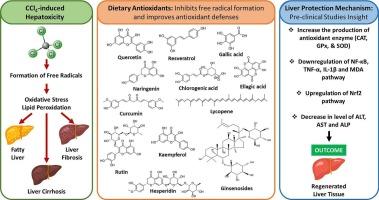饮食抗氧化剂减轻四氯化碳引起的肝毒性:临床前见解的综合综述
IF 4
2区 农林科学
Q2 FOOD SCIENCE & TECHNOLOGY
引用次数: 0
摘要
肝毒性一直是全球关注的主要健康问题,众所周知,四氯化碳(CCl4)是一种肝毒性物质。作为一种强大的促氧化剂,CCl4通过脂质过氧化、氧化应激和炎症诱导肝脏损伤,这通常导致肝纤维化/肝硬化,在某些情况下,导致肝细胞癌。由于传统治疗方法的局限性及其相关毒性,膳食抗氧化剂已成为保护肝脏的有效天然解决方案。本文综述了姜黄素、绿原酸、鞣花酸、没食子酸、人参皂苷、橙皮苷、山奈酚、番茄红素、柚皮素、槲皮素、白藜芦醇和芦丁等植物源性抗氧化剂的临床前数据,探讨了它们在减轻ccl4诱导的肝毒性方面的潜力。它还讨论了多种机制和动物临床前研究,强调了饮食抗氧化剂在减少肝损伤方面的潜力。本综述旨在为揭示膳食抗氧化剂在控制和预防肝毒性方面的潜力奠定基础,并为进一步探索其临床应用开辟新的研究途径。本文章由计算机程序翻译,如有差异,请以英文原文为准。

Dietary antioxidants in mitigating carbon tetrachloride-induced hepatoxicity: An integrative review of preclinical insights
Liver toxicity has remained the primary health concern globally, and carbon tetrachloride (CCl4) is well-known as a hepatotoxic agent. Being a powerful pro-oxidant, CCl4 induces liver damage via lipid peroxidation, oxidative stress, and inflammation, which often leads to hepatic fibrosis/cirrhosis and, in some cases, hepatocellular carcinoma. Owing to the limitations of traditional treatments and their related toxicity, dietary antioxidants have emerged as an effective natural solution for liver protection. The current review comprehends the information about plant-derived antioxidants such as curcumin, chlorogenic acids, ellagic acid, gallic acid, ginsenosides, hesperidin, kaempferol, lycopene, naringenin, quercetin, resveratrol, and rutin explores their potential in mitigating CCl4-induced liver toxicity based on preclinical data. It also discusses the diverse mechanisms and preclinical studies on animals, highlighting the potential of dietary antioxidants in reducing liver damage. This review intends to serve as the foundation to signify the potential of dietary antioxidants in managing and preventing liver toxicity and open new avenues for future research to explore their clinical applications.
求助全文
通过发布文献求助,成功后即可免费获取论文全文。
去求助
来源期刊

Journal of Functional Foods
FOOD SCIENCE & TECHNOLOGY-
CiteScore
9.60
自引率
1.80%
发文量
428
审稿时长
76 days
期刊介绍:
Journal of Functional Foods continues with the same aims and scope, editorial team, submission system and rigorous peer review. We give authors the possibility to publish their top-quality papers in a well-established leading journal in the food and nutrition fields. The Journal will keep its rigorous criteria to screen high impact research addressing relevant scientific topics and performed by sound methodologies.
The Journal of Functional Foods aims to bring together the results of fundamental and applied research into healthy foods and biologically active food ingredients.
The Journal is centered in the specific area at the boundaries among food technology, nutrition and health welcoming papers having a good interdisciplinary approach. The Journal will cover the fields of plant bioactives; dietary fibre, probiotics; functional lipids; bioactive peptides; vitamins, minerals and botanicals and other dietary supplements. Nutritional and technological aspects related to the development of functional foods and beverages are of core interest to the journal. Experimental works dealing with food digestion, bioavailability of food bioactives and on the mechanisms by which foods and their components are able to modulate physiological parameters connected with disease prevention are of particular interest as well as those dealing with personalized nutrition and nutritional needs in pathological subjects.
 求助内容:
求助内容: 应助结果提醒方式:
应助结果提醒方式:


